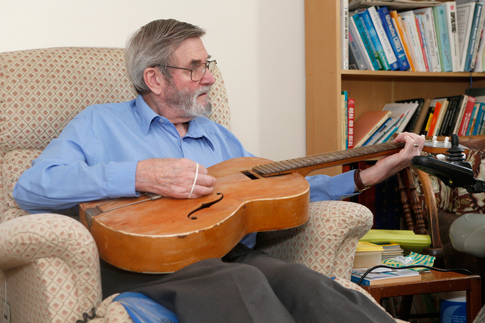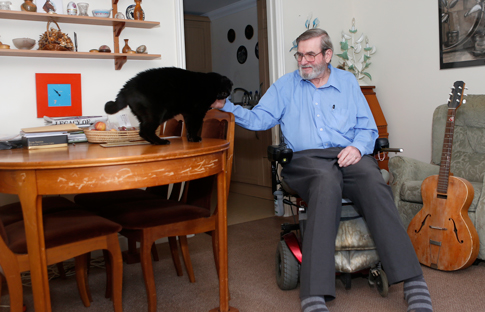How one man kept track of his wellbeing while caring for his wife, who had dementia
From the February/March 2016 issue of our magazine, caring for someone with dementia can be overwhelming and isolating. Heather Stephen speaks to a man who devised a way to keep track of his wellbeing and maintain his wife's care.

When John Peachey was told his wife had Alzheimer's disease he was devastated, but found there was little support for him as a carer.
John, now 77, from North Walsham, Norfolk, says he and Carol first thought her constant headaches and memory lapses might be down to the menopause as she was only in her early 60s. One particular incident caused him to think again.
'We both took our cars to the garage to be serviced and afterwards I set off slightly before Carol.
'About 10 minutes later she arrived home furious that I hadn't waited for her as she couldn't remember the way home, even though we'd driven that way several times. That's when I thought "this is something more serious".'
After the GP carried out tests, Carol was referred to a hospital specialist who confirmed the shattering news she had Alzheimer's.
'Carol just shut down. She was in complete denial,' says John.
'The only advice I was given was to look at a poster for Alzheimer's Society in the waiting room, but I was too screwed-up to look at it.'
Increasingly difficult
Carol had a demanding and rewarding career managing care homes in Wrexham, which she gave up a year after diagnosis.
As time went on, John found it increasingly difficult to witness the changes in his wife.
'When our youngest son started secondary school Carol had gone off to university and studied for a fine art degree, so when, in those hospital tests, she couldn't even copy a simple outline, that hit me right in the solar plexus.
'It was so painful to watch her struggling to do things like washing-up. I am sorry to say I stepped in and took over, but that was a mistake because then she just gave up trying to do anything.'
John says he found the change in Carol's personality particularly hard to take.
'I married her because she was a chatterbox, but she wasn't a chatterbox anymore and sometimes it was hard to remember how she used to be.'
Toughest times
John has a progressive condition called hereditary spastic paraplegia that affects his mobility. As the years went by he found the carer role ever more challenging, but was determined to look after Carol for as long as he could.
One of the toughest times came when John realised he would have to start helping Carol to eat her meals.
'We sat down to eat and she just looked at me. I thought, "I don't know if I can do this," but I did. It was hard at first but I got used to it.
'There were other days when she wet herself twice in a day and I thought, "How long can I carry on like this?" but I just got on with it because I loved her.'
John's mission to keep Carol at home was put to the test when she went to hospital for four weeks respite. This was extended to eight weeks to monitor a medication change.

By this stage John was using a four-wheeled walker and the doctors, concerned about his ability to care for Carol, wanted her to move into residential care.
He says,
'The hospital said I wouldn't be able to cope if a crisis situation came up and I had one hell of a battle to take her home.'
After John begged hospital staff to give him the chance to prove he could handle her care, they agreed to allow her home with a pledge to review the situation in two weeks.
Scoring system
John knew he needed to prove he was up to looking after Carol, so he developed a scoring system to track how he was feeling and coping.
The responses ranged from one (brilliant), two and three (almost normal), four and five (hard work), six (challenging), seven (very challenging) and eight (extremely challenging) to nine (cannot do this anymore).
Each evening John reflected on how the day had gone and gave it a score. When the score was six or higher he wrote a note about what he had found most difficult. This helped him deal with his feelings and provided a record of how he had dealt with the day's challenges.
Within those two weeks the scores mostly came in at four or five with the occasional six, but he was able to show there was nothing he wasn't coping with.
Carol stayed, and John cared for her at home for another three years.
Daily review
John continued his unique scoring system even after winning his case for Carol to remain at home.
He says,
'I found this review, which only took a few minutes each day, was a very useful way to let me know how I was feeling and how things were changing.'
John calculated the average score every four weeks, and when it escalated over the first three months he hired domestic help for cooking, cleaning and company. When it increased again later on, he boosted day care support from once to three times a week.

John was able to use the numbers to help him compare each day and come to a decision about what to do next. He found it a comfort that the average for that first year was between four and five – 'hard work' but not unbearable.
'We all know that caring for someone with dementia is hard work but when I looked at the scores only one day in eight was scored as "challenging" and one day in 22 was "very challenging", while one day in eight was "almost normal" and the others were scored "hard work".
'Using numbers like this helped me to become aware of my feelings and decide on the right time to make a change as Carol's condition got worse.'
By the time Carol lost her mobility four years ago, John was in a wheelchair and he finally scored a nine – admitting he could no longer cope. She lived in a care home until she passed away last April.
Power of reflection
John was drawn to using numbers as a former engineer and admits this system might not be for everyone.
However he says,
'Even if people don't want to give their emotion a number it is still good to write things down to reflect on how things are going.
'Carers should make the best of each day. Don't worry too much about the day before and what might be to come, but if you are in touch with how you are coping each day it makes it so much easier to have a plan for the future when you really can't cope anymore.'








